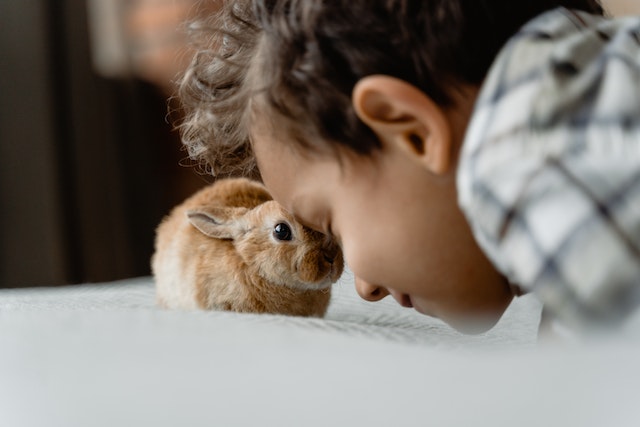- 1. Honesty – a character trait for building relationships
- 2. Self-confidence – a tool for lifelong success
- 4. Courage – a strengthening tool to develop self-belief
- 5. Creativity – a unique skill that can enable parallel thinking
- 6. Patience – a true virtue that all children need today
- 7. Compassion – giving value to all aspects of life
- 8. Curiosity – a sense of wonder and a desire to solve problems
- 9. Respect – being sensitive and appreciative of those around them
- 10. Discipline – having a long-term, fulfilling work ethic
By giving our children the right moral compass and accompanying character traits, we can set them up for a lifetime of success and happiness. You can transform the way a child interacts with the world by instilling kindness, confidence, courage, and other positive character traits for kids.
Math & ELA | PreK To Grade 5
Kids see fun.
You see real learning outcomes.
Watch your kids fall in love with math & reading through our scientifically designed curriculum.
Parents, try for free Teachers, use for free
Through guided lessons, role-playing exercises, and storytelling, you can teach children the impact of the right traits in everyday life.
What are Character Traits?

Before uncovering what traits are important to lifelong success, we should focus on what exactly we mean when we say traits. When we ask ourselves, “What are character traits?” we need to focus on what they mean to children. Character traits for kids imply core values, personality aspects, and beliefs that children hold about themselves and the world.
They can emerge organically, through experiences, or via sources such as their parents or teachers. Both positive and negative character traits can emerge through either pathway, so it is vital to use the right strategy when teaching them. The values of empathy, responsibility, optimism, and work ethic should be taught in an engaging and uplifting way.
Why Do Kids Need the Right Character Traits?

It is also helpful to know why kids need character traits in the first place. Not only do they empower children holistically, but they also help them deal with stressful situations. Positive character traits for kids provide a guiding light to analyze emotions and understand situations better.
Your kids can nurture positive and useful character traits over time and understand the detrimental role of negative traits as well. They can work on strengthening areas, such as humility, independence, and curiosity, through different exercises and self-reflection. It ultimately brings out the inner potential each child holds while giving them the tools they need to be productive human beings.
15 Most Important Character Traits That Kids Need to Flourish

Now that we’ve explored the role of character traits in kids’ lives, it is important to know which traits should be prioritized. While every positive character trait is good for children, it is good to emphasize a handful of them to build the foundation for a strong personality.
1. Honesty – a character trait for building relationships
Truthfulness is a vital character trait for kids as it helps ensure transparency within relationships. Your child will be more inclined to tell you the truth if they believe honesty to be a core virtue that everyone should uphold.
How To Teach: You can focus on storytelling and role-playing exercises to teach honesty. By explaining the differences between white lies and malicious lies, you can strengthen their understanding of honesty.
Character-Building Activities: One of the best character-building activities to teach honesty is through storytelling assessments. You can recite multiple types of stories where a character is deceitful and ask your kid whether they should be honest or not across different scenarios.
2. Self-confidence – a tool for lifelong success
Self-confidence is an essential tool that can help your children succeed at school and be more expressive with their thoughts and feelings. With a little self-confidence, your kids can actively participate in class, enjoy outdoor activities more freely, and be more self-assured during times of stress.
How To Teach: You can teach self-confidence by focusing on skill development, such as through a hobby or a new experience. Overcoming challenges will allow them to emerge more confident in their own abilities.
Character-Building Activities: You can enroll your children in drama, music, and art classes to make them bolder if they’re shy around new people or new experiences. You can also ask your kids to write a letter to themselves, mentioning what they’re proud of and the accomplishments that brought them joy.
Related Reading: Interesting Debate Topics for Kids of All Ages

3. Empathy – understanding other people’s emotions (H3)
Empathy can help your kids understand what another person is feeling when they’re talking and provide them with the necessary information, comfort, and support they need. It can help kids adjust to social dynamics and become more aware of emotional development.
How To Teach: A great way to teach empathy is through puppet play. You can help your kids learn why empathy is important by seeing puppets interact, get hurt, apologize, and coexist with each other.
Character-Building Activities: By actively assessing characters’ emotions from a storybook or passage, your kids can develop empathy skills. You can also have them reflect on past misbehaviors and mention what approaches might have worked better to resolve conflict.
4. Courage – a strengthening tool to develop self-belief
Courage can be a powerful tool to help kids become more aware of their own abilities. Your little ones can be braver in situations where they would normally shy away and take advantage of new experiences with ease.
How To Teach: Courage can be taught through stories, role-playing, and affirmations. You can teach your child to be more courageous by actively presenting new challenges and allowing kids to fail naturally.
Character-Building Activities: Reading memoirs of courageous people, participating in sports, and writing down fears reflectively can help build courage.

5. Creativity – a unique skill that can enable parallel thinking
Creativity can be useful to kids for self-expression and problem-solving. It can help children develop an instinct for looking at challenges through new perspectives. As a character trait, it can help kids improve their communication and leadership skills over time.
How To Teach: Creativity can be taught through the appreciation of arts, food, and music via new lenses. You can also encourage your children to use more colors when drawing to help them expand their horizons.
Character-Building Activities: Painting, playing an instrument, and even innovating with Lego blocks can help your children build creativity skills at home.

6. Patience – a true virtue that all children need today
Patience is key for long-term thinking and building a goal-oriented mindset. You can strengthen patience in kids to help them avoid being impulsive, disrespectful, and irritable. You can also teach character traits to show the importance of listening and waiting while focusing on tasks and objectives.
How To Teach: Through delayed gratification, mindfulness, and teaching the value of waiting, you can help your child develop this character trait.
Character-Building Activities: Patience exercises, role-playing, and practicing complex tasks can cultivate patience. Your children can participate in activities such as card stacking, meditation, gardening, and baking to get an intuitive sense of what rewards can be reaped through patience.

7. Compassion – giving value to all aspects of life
Being compassionate can help kids live a well-adjusted and socially oriented life. Kids must understand how to interact with objects, pets, and humans with compassion rather than jealousy or hatred. When compassion is fostered in children, they can even show forgiveness when someone has hurt and apologized to them.
How To Teach: You can teach compassion through daily practice, affirmations, and by presenting them with new experiences. You can give them the right tools to be compassionate to people of different backgrounds and beliefs.
Character-Building Activities: New social experiences can help your kids develop compassion towards people. Exposure to pets and animals in zoos and farms can teach them this valuable character trait. Allowing them to care for a gentle creature, such as a chick or a hamster, can also strengthen their responsibility skills.
8. Curiosity – a sense of wonder and a desire to solve problems
Curiosity can allow your children to explore the world with a new perspective. You can empower them to develop new solutions to traditional problems and let their minds be active throughout the day with new questions.
How To Teach: Curiosity can be cultivated through the right learning programs, classes, and sessions that encourage kids to solve problems. You can also encourage your child to think laterally when reading about dinosaurs, plants, oceans, etc.
Character-Building Activities: Science experiments, construction toys, Lego blocks, art supplies, and instruments can help build curiosity as a core character trait. You can also actively widen their horizons by involving them in different activities that challenge different skills.
9. Respect – being sensitive and appreciative of those around them
The concept of respect, that is, self-respect and respect for others, must be explained to children. Help them understand why respect is important and why it is good to treat others how you’d like to be treated.
How To Teach: You can focus on the role of respect and how it is earned and appreciated over time. You can role-play, read stories, and encourage active interactions with elder influences in your child’s life.
Character-Building Activities: Through puppet play, storybooks, and sharing of toys, you can build respect as a character trait in your children. You can also socialize your child with older kids and help them understand the role of respect through active play.
10. Discipline – having a long-term, fulfilling work ethic
By reframing discipline to be focused on work ethic and perseverance, you can encourage your children to develop the right mindset early on. Help them reap the benefits of disciplined work by setting objectives such as cleaning their room, helping out with chores, finishing their homework on time, etc.
How To Teach: A great way to instill discipline in your children is to set daily habits. Having a routine that is flexible yet work-oriented will help kids pick up on what it means to be more disciplined.
Character-Building Activities: Puzzles, worksheets, and brain games will help your kids become goal-oriented, patient, and focused. These can help build discipline and work ethic at a young age, allowing them to succeed in any class at school.
Related Reading: Best Parenting Strategies For Positive Discipline in Kids

11. Optimism – being aware of negative circumstances and persevering through positivity
Having a sense of optimism and positivity can help your kids live a fulfilling life beyond school and work. They can enjoy the present moment fully while being attentive in class and finishing their homework. They can also be less susceptible to tantrums and anger if they have optimism as a core character trait.
How To Teach: Encouraging kids to be more optimistic when they want to give up is a great way to teach the value of the trait. You can further emphasize that it is fine to fail and good to experience failure to learn lessons from it.
Character-Building Activities: Affirmations, daily compliments, positive stories, and physical activities can help develop a sense of optimism. You can also have your kids rewrite fearful scenarios through positive and open-minded language.
12. Integrity – knowing the importance of giving your word
Teaching the value of integrity is crucial for early development, especially if your child doesn’t instinctively know what honesty, work ethic, and promises mean. Teaching integrity as a valuable character trait for kids can help them hold themselves accountable for promises, tasks, and goals.
How To Teach: With integrity being one of the most important positive character traits for kids, you should focus on small activities that kids can promise and fulfill. These can include finishing a worksheet, cleaning their room, and folding their laundry.
Character-Building Activities: Integrity can be built as a foundational character trait through team activities, class projects, hobbies, and mission statements. You can set goals for your kids to accomplish each week, such as learning a new word, improving their math scores, etc.
Related Reading: How to Help Kids with Math: 6 Innovating Approaches
13. Self-reliance – being independent in thought and action
Empowering kids to be independent can help them become more confident of their abilities and allow them to pursue new interests, hobbies, and activities. They can also perform better at school, knowing that they can accomplish anything they set their mind to.
How To Teach: By keeping your kids involved in daily activities and teaching them basic to advanced tasks, you can help them become more self-reliant.
Character-Building Activities: Involving kids in chores that include cooking, pet care, laundry, and home organization can teach them self-reliance.
14. Adaptability – understanding the nature of evolving things
Adaptability is one of the more important character traits for kids, as it enables them to remain content in dynamic situations. This can help them better manage their emotions when they experience conflict at school.
How To Teach: Adaptability can be taught through role-playing, activities, and games that need them to imagine new characteristics, use new skills, and gain perception.
Character-Building Activities: You can ask your kids to write down three challenges they face at school or home and how they can become more adaptable to manage the issue better. You can also encourage them to share toys, books, and activities with others at an early age.
Related Reading: Signs That Your Child is Struggling in School

15. Supportiveness – helping someone else without expectation
Supportiveness is a valuable skill that kids can instinctively pick up as it is a simple concept to explore. When kids become supportive of other kids, they can grow together as a collective rather than resolve conflict through aggression.
How To Teach: Supportiveness can be taught as a standard practice at home, as well as through exercises in role-playing via puppets and toys.
Character-Building Activities: You can have your kids spot the need of the hour for a character in a story, an animal in distress, or even their favorite toy when they’re feeling alone. You can ask them to identify what that object or person might need through empathy and what actions they can take to support them.
Negative Character Traits That Kids Should Keep in Mind

It is also important to explain the impact of negative characteristics and how they can diminish our experiences over time. By shifting the discussion of negative traits from a punishment-oriented one to a discussion-based one, kids will be more receptive to eliminating negative traits from their mindset. By knowing what negative traits to avoid, you can be in a better position to remove them from your child’s persona.
Let’s explore the list of character traits examples that can be negative:
- Bullying should be a primary negative trait that should be eliminated.
- Lying is a common negative trait among younger children who don’t understand honesty fully.
- Cheating is a critical negative character trait that should be curtailed.
- Cursing and using foul language is another vital negative character trait in kids.
- Disrespectfulness should also be a negative trait that is addressed early and curbed.
In conclusion, it is important to follow the strategies of identifying the correct positive traits, knowing how to teach them, and opting for exercises to strengthen them. You can also identify negative character traits that kids should avoid and address them in a discussion-oriented way to help kids reflect on their actions.
For younger children, focusing on the more basic character traits, such as honesty and self-confidence, is essential for cognitive and emotional development.
Frequently Asked Questions (FAQs)
What stories are best for teaching positive traits?
Stories that are rich in narrative and are from a person’s point of view can help build positive traits.
How can I use technology to teach helpful character traits?
Online learning games, character-building activities, and watching shows that build self-worth can help your child learn positive traits more effectively.
How can I make my child let go of negative character traits?
Helping children reflect on their actions, role-playing certain situations that help them reach their own realizations, and other confidence-building activities can help them let go of negative traits.
What are some character traits to build a positive attitude in kids?
Here is a list of positive character traits for kids:
- Kindness
- Generosity
- Enthusiasm
- Courage
- Honesty
Can my child’s friends influence their character traits?
Yes. To a certain extent, your kid’s friends can influence their traits, especially if they spend a significant amount of time with them.
























